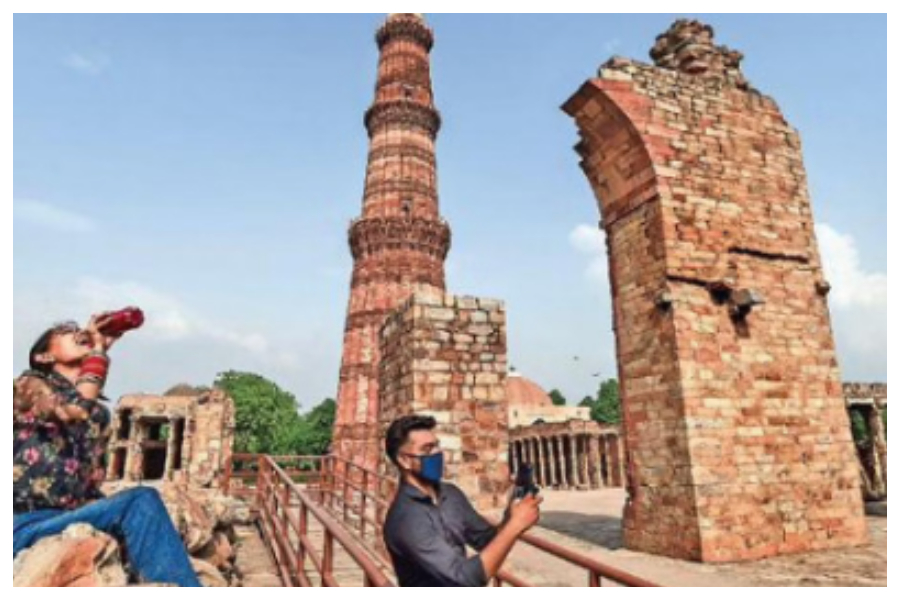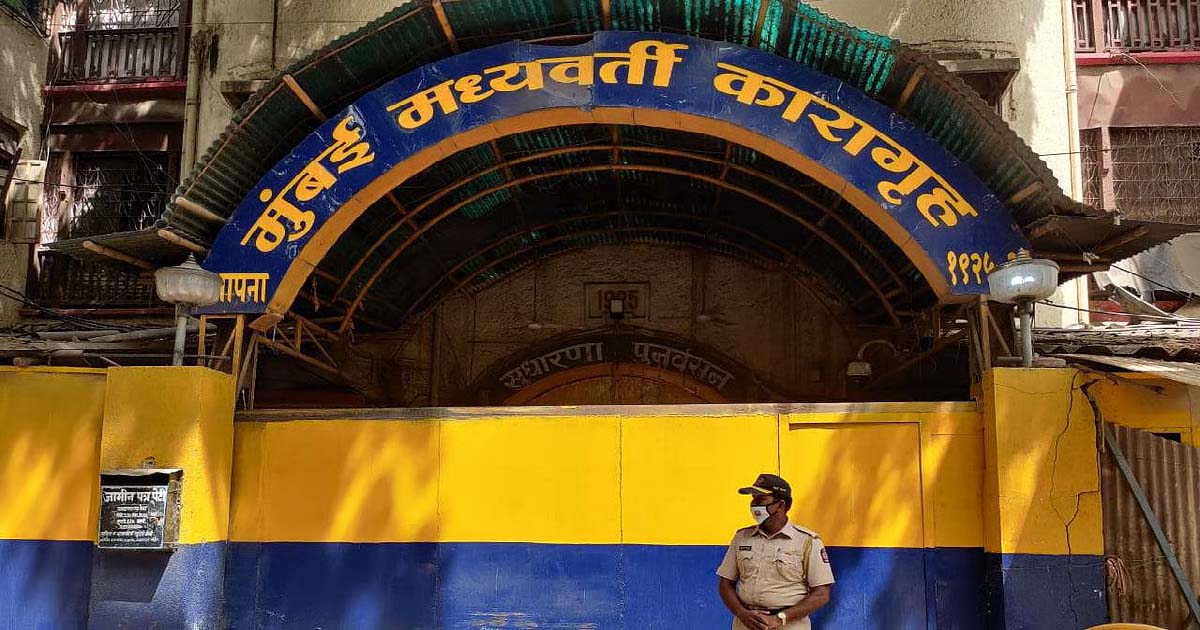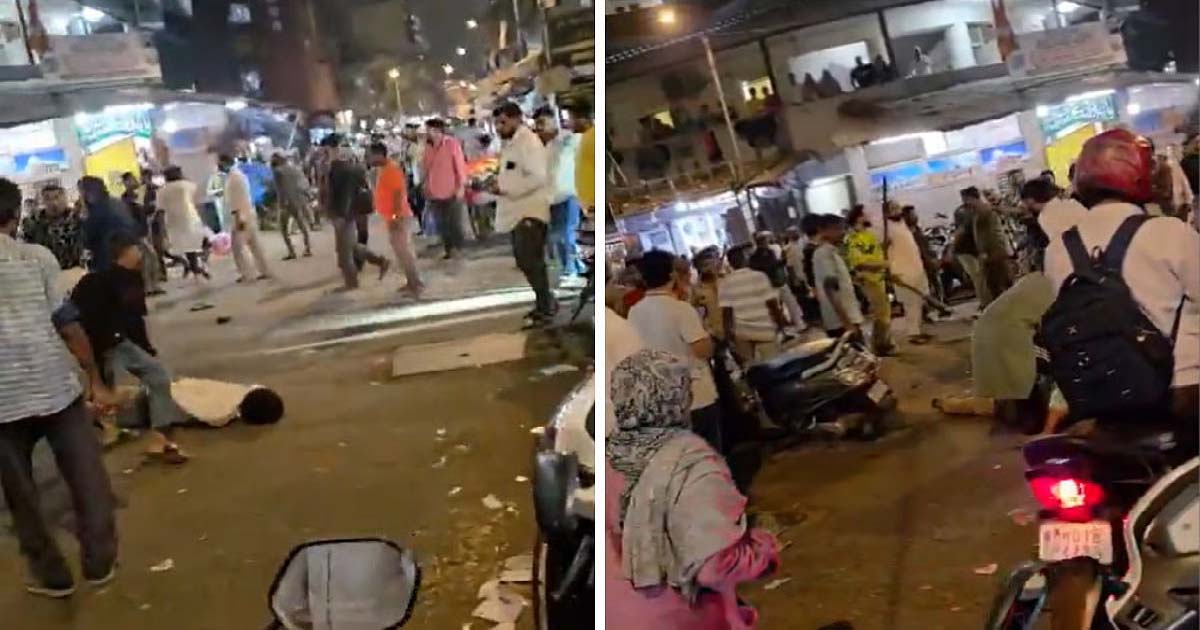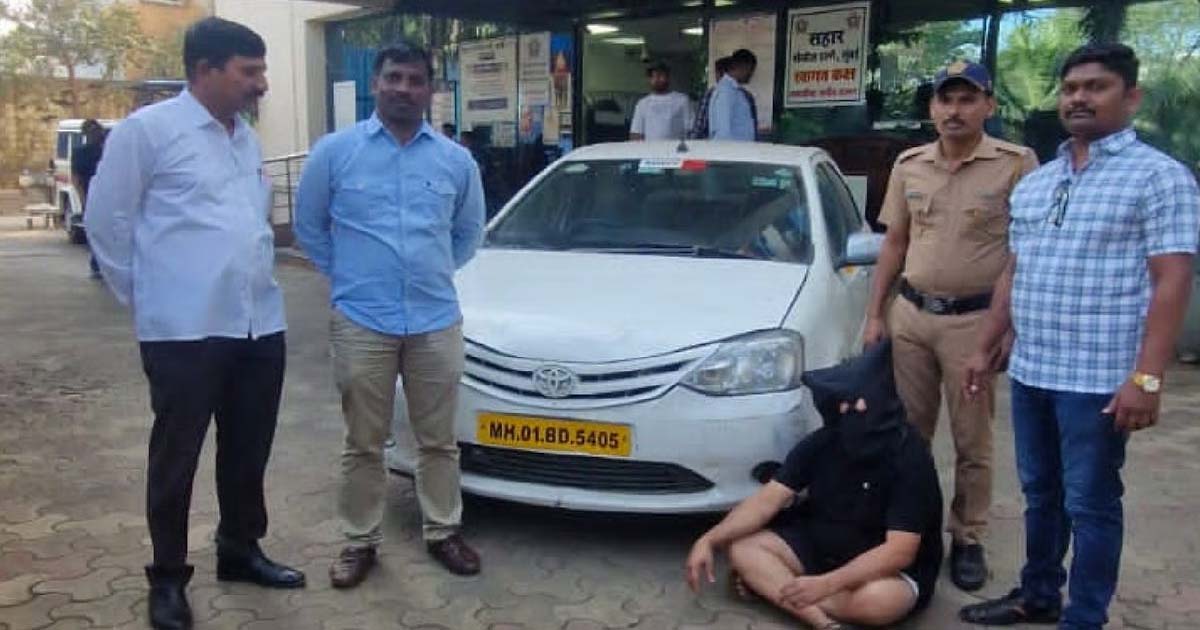Crime
Delhi Court reserves appeal seeking restoration of Hindu, Jain temples at Qutub Minar

A Delhi court on Tuesday reserved the appeal against the dismissal of a suit seeking restoration of the Hindu and Jain temples and the deities at the Qutub Minar complex.
Additional District Judge Nikhil Chopra of the Saket Court was hearing the appeal challenging the rejection of a suit alleging that the Quwwat-Ul-Islam Masjid situated within the Qutub Minar complex in Mehrauli was built in place of a temple complex.
After the detailed hearing, the court said the verdict will be delivered on June 9.
During the course of the hearing, the appellant alleged that around 27 Hindu and Jain temples were desecrated and damaged in 1198 under the rule of Mughal Emperor Qutub-Din-Aibak raising the construction of the said mosque in place of those temples.
The Archaeological Survey of India opposed the suit, submitting that the ‘fundamental rights cannot be availed in violation of any status of the land’.
“It will be contrary to the provisions of the AMASR Act, 1958 to agree to the contention of the Respondents or any other person claiming a fundamental right to worship in this centrally protected monument,” read the affidavit submitted by the ASI.
Earlier on February 22, allowing the appeal, Additional District Judge Pooja Talwar issued notice to the Union of India through the Ministry of Culture, Director General of Archaeological Survey of India, and Superintending Archaeologist, Delhi Circle, ASI.
The civil suit, filed on behalf of Jain deity Tirthankar Lord Rishabh Dev and Hindu deity Lord Vishnu (through their next of friends), was seeking restoration of the alleged temple complex, comprising as many as 27 temples.
As per the suit, the temples were dismantled, desecrated, and damaged under the command of Slave Dynasty Emperor Qutub-Din-Aibak, who raised some construction at the same very place and named it the Quwwat-Ul-Islam Mosque.
The ruler failed to completely demolish the existing temples and only partial demolition was carried out after reusing the material of the temples, the said mosque was erected, it read.
In December last year, Civil Judge Neha Sharma noted that the plaintiffs have no absolute right to restore and worship in the property as public order which is an exception under Article 25 and 26 of the Constitution. This requires the status quo be maintained and the protected monument to be used for no religious purpose. It is also an established fact that Quwwat-Ul-Islam Masjid was built atop existing temples, but the property was not being used for any religious purposes and no prayers were being offered here.
The court had observed that wrongs may have been committed in the past, “but such wrongs cannot be the basis for disturbing the peace of our present and future”.
Referring to a portion of the Ayodhya judgment, the court had said: “Cognisant as we are of our history and of the need for the nation to confront it, Independence was a watershed moment to heal the wounds of the past. Historical wrongs cannot be remedied by the people taking the law into their own hands.”
Crime
Mumbai Crime: Undertrial Prisoner Assaults Policeman Inside Arthur Road Jail, Case Registered

Mumbai: A shocking incident has come to light from Mumbai’s Arthur Road Jail, where an undertrial prisoner allegedly assaulted a police constable on duty.
The accused, Lokendra Uday Singh Rawat (35), is reported to have headbutted Police Constable Hani Baburao Wagh (30), causing injuries to his nose, and also abused and pushed other on-duty police personnel. A case has been registered in this connection at the N. M. Joshi Marg police station.
According to the FIR, the complainant, Police Constable Wagh, is attached to Armed Police Division–2, Tardeo. On January 27, he reported for his 24-hour day-duty shift at Arthur Road Jail at around 8 am and was assigned security duty at the main entrance of the prison.
At around 9 pm, Armed Police Constables Suresh Sandu Mali and Sachin Chavan brought undertrial Lokendra Rawat back to the jail after producing him before the Dindoshi Court. Rawat allegedly appeared agitated and, after entering the jail premises, sat near the gate and began verbally abusing the police personnel on duty.
Constable Wagh asked Rawat to calm down and refrain from using abusive language. However, Rawat allegedly became more aggressive and continued shouting abuses. When Wagh approached him again to pacify the situation, Rawat suddenly headbutted him on the nose with force.
As a result, Constable Wagh sustained injuries and started bleeding. Fellow constables Sachin Chavan and Suresh Mali immediately intervened, restrained the accused, and informed the on-duty prison authorities about the incident. Rawat was subsequently sent for medical examination to Sir J.J. Hospital.
After receiving medical treatment, the injured constable lodged a formal complaint on January 28 at the N. M. Joshi Marg police station. Based on the complaint, police have registered a case against the undertrial under relevant sections of the Bharatiya Nyaya Sanhita (BNS). Further investigation is ongoing.
Crime
Mumbai Crime: One Critical Among 5 Injured After Violent Group Clash Breaks Out In Nagpada, 13 Detained

Mumbai: A violent confrontation between two groups erupted in South Mumbai’s Nagpada area late Thursday night, leaving several people injured and sparking a massive police response. Authorities have confirmed that one individual remains in critical condition following the brawl, which has once again put the spotlight on the volatile security situation in the densely populated area.
According to the Mumbai Police, the altercation broke out between two local groups over a financial dispute that escalated rapidly. What reportedly began as a verbal spat soon turned into a physical battle.
A video of the clash has surfaced on the internet shows the exact moments of the violent situation. Two men can be seen lying on the road, probably unconsious after participating in the brawl. Five to six other men can be seen weilding rods and sticks engaged in a fight, in full public view.
The violence resulted in five to six individuals sustaining serious injuries. They were rushed to a nearby hospital for emergency treatment. Medical officials confirmed this morning that while most are stable, one victim is currently in critical condition and is battling for life in the intensive care unit.
The Nagpada Police arrived at the scene shortly after the violence peaked to disperse the crowd and restore order. Heavy police deployment remained in the area throughout the night to prevent any retaliatory attacks or further communal or localised tension.
In a swift crackdown following the incident, the Mumbai Police have detained 13 individuals suspected of involvement in the clash. The police have officially registered a case against the accused parties under various sections of the Indian Penal Code (IPC), including Section 109 and Section 191.
As of Friday morning, the situation in Nagpada is reported to be under control, though an uneasy calm prevails. Security has been beefed up at key intersections, and patrolling has been intensified.
Crime
Mumbai Crime: 50-Year-Old Taxi Driver Arrested For Cheating American National Of ₹18,000 For 400-Metre Ride Near Airport

Mumbai: The Sahar Police on January 28 arrested a taxi driver for allegedly defrauding an American national of Rs 18,000 for a taxi ride of just 400 metres.
The accused has been identified as Yashraj Yadav alias Papuu (50). The police have seized the vehicle, and the accused is currently in judicial custody. Two accused were involved in the crime. One is Yadav, while his associate, Taufiq Shaikh, is absconding.
The case came to light after a social media post by the American national, Argentina Ariano, went viral. In her post, she alleged that she was scammed by a taxi driver shortly after arriving in Mumbai.
According to the police, the victim had arrived in India for work. The incident took place on January 12 at around midnight after she landed at the Mumbai International Airport.
She alleged that the taxi driver charged her Rs 18,000 for a trip to a hotel located barely 400 metres away. Yadav allegedly took the woman on a 20-minute drive in Andheri (East), returned to the same locality, dropped her at the hotel and collected the fare.
Nearly 15 days later, on January 26, she posted about the incident on social media. In her post, she wrote: “Landed in Mumbai recently, took a taxi to the Hilton Hotel. The driver and another man first took us to an unknown location, charged us $200 (Rs 18,000), and then dropped us at the hotel, which was only 400 metres away. Taxi No: MH 01 BD 5405.” She tagged Mumbai Police and the Traffic Police and used the hashtag #scam.
Responding to the post, Mumbai Police replied, “We have followed you. Please share your contact details in DM.” Following this, the Sahar Police initiated an inquiry.
During the investigation, police found that there are three Hilton hotels near the airport and identified the exact hotel where the American national had stayed. However, within 12 to 13 hours of the incident, she had checked out of the hotel and left the country. She checked out the next day and went to Pune, from where, after completing her tour, she returned to the US.
Manoj Chalake, Senior Police Inspector of Sahar Police Station, said, “We are trying to get the victim’s statement via video call or email. She did not inform the hotel staff about the incident. We have repeatedly informed people to communicate with the hotel or the local authority if a tourist suspects that a cabbie is fleecing them.”
The police contacted her and requested her to file a formal complaint. Although she responded with “Okay”, she did not lodge any complaint.
The Sahar Police then registered a suo motu case on January 28 against an unknown taxi driver under Sections 318(4) (cheating) and 3(5) of the Bharatiya Nyaya Sanhita (BNS) and launched a search operation.
Using the taxi number mentioned in the post, police traced the accused, Yadav, who resides in Sahar Village and is a permit taxi driver. The vehicle, a white Toyota Etios, has been seized. The vehicle is registered under the S.M.S. Tours and Travels company. Police said they would send his details to the Regional Transport Office (RTO) for cancellation of his licence.
A police officer said two persons were involved in the crime — Yadav and his associate, Taufiq Shaikh, around 50 years old. Yadav allegedly negotiated the fare with the foreign national and then called Shaikh, who arrived with the car. Both allegedly cheated the tourist.
Shaikh later took the money from Yadav and fled to Uttar Pradesh. Police records show that several cheating cases have been registered against Shaikh at various police stations. Yadav, however, has no prior criminal record.
Manoj Chalake added, “We have seized the car. The cash could not be recovered as the other accused took the money and fled. We are searching for him. We will soon call the company owner for a statement.”
He further said that the police do not have much information about the foreign national, as she has not provided details about the purpose of her visit or other relevant information.
The Metropolitan Magistrate Court initially remanded Yadav to one day of police custody and later sent him to judicial custody.
-

 Crime3 years ago
Crime3 years agoClass 10 student jumps to death in Jaipur
-

 Maharashtra1 year ago
Maharashtra1 year agoMumbai Local Train Update: Central Railway’s New Timetable Comes Into Effect; Check Full List Of Revised Timings & Stations
-

 Maharashtra1 year ago
Maharashtra1 year agoMumbai To Go Toll-Free Tonight! Maharashtra Govt Announces Complete Toll Waiver For Light Motor Vehicles At All 5 Entry Points Of City
-

 Maharashtra1 year ago
Maharashtra1 year agoFalse photo of Imtiaz Jaleel’s rally, exposing the fooling conspiracy
-

 National News1 year ago
National News1 year agoMinistry of Railways rolls out Special Drive 4.0 with focus on digitisation, cleanliness, inclusiveness and grievance redressal
-

 Maharashtra1 year ago
Maharashtra1 year agoMaharashtra Elections 2024: Mumbai Metro & BEST Services Extended Till Midnight On Voting Day
-

 National News1 year ago
National News1 year agoJ&K: 4 Jawans Killed, 28 Injured After Bus Carrying BSF Personnel For Poll Duty Falls Into Gorge In Budgam; Terrifying Visuals Surface
-

 Crime1 year ago
Crime1 year agoBaba Siddique Murder: Mumbai Police Unable To Get Lawrence Bishnoi Custody Due To Home Ministry Order, Says Report






















